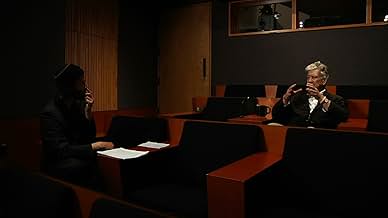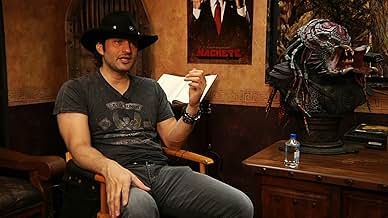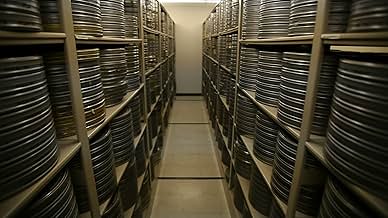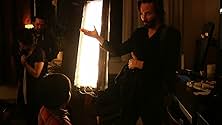CALIFICACIÓN DE IMDb
7.6/10
14 k
TU CALIFICACIÓN
Agrega una trama en tu idiomaThe documentary investigates the history, process and workflow of both digital and photochemical film creation.The documentary investigates the history, process and workflow of both digital and photochemical film creation.The documentary investigates the history, process and workflow of both digital and photochemical film creation.
- Dirección
- Guionista
- Elenco
- Premios
- 1 nominación en total
- Dirección
- Guionista
- Todo el elenco y el equipo
- Producción, taquilla y más en IMDbPro
Opiniones destacadas
Film is dead, or is it? With major distributors in USA going digital this year in lieu of film, the death knell has been sounded that perhaps it's not too long before celluloid film projection is a thing of the past, and with it comes digital filmmaking, production, distribution and projection. But does it have to be that way, and can both mediums co-exist to satisfy the various sections of the creative market? Produced by Justin Szlasa and Keanu Reeves, the latter who was here in Hong Kong for a masterclass, Side by Side is the documentary written and directed by Christopher Kenneally, that deep dives into both sides of the equation.
And who better than to interview those who have dabbled with both mediums? What made this documentary a compelling watch is Keanneally's ability to cover an entire range of topics related to this issue, tracing the history of both mediums, especially the digital one, and giving depth into backgrounds, reasons and rationale taken from those who have dealt with both old and new technologies. Having Keanu Reeves turn into the interviewer works in both levels of attracting the casual viewer into watching this, as well as on the interview front, made it easy for filmmakers to relate and open up to one of their own, as they talk about the medium, how it impacts filmmaking, and from acting in front of the camera, the camera technologies themselves, and the case for distribution and exhibition, weighing in on the pros and cons at every stage.
These filmmakers are none other than the who's who of Hollywood luminaries, such as James Cameron, George Lucas, Martin Scorsese, David Fincher, Robert Rodriguez, Christopher Nolan, Danny Boyle, Richard Linklaer, David Lynch, Joel Schumacher, Steven Soderbergh, Lars von Trier, and both Lana and Andy Wachowski whom Keanu Reeves made the prolific Matrix trilogy. And it's not just directors, but also containing interviews with editors and cinematographers such as one of my personal favourites Wally Pfister, who together with Nolan stand on the side of celluloid, famously resisting Warner Bros' attempt to turn their lucrative Dark Knight projects into the digital or 3D formats.
While one may get distracted by the star studded lineup, we get to see how each are so passionate about the medium they believe in, and the compelling arguments they make for and against their case, listening from the horse's mouth of those who are in the industry, together with the satisfaction gained and challenges they face. For instance, like Fincher, digital filmmaking gave rise to cameras that can be designed to cater to the nature of the shots he had intended, without which films like The Social Network, or The Girl With the Dragon Tattoo, cannot achieve certain shots or have the camera angles so desired. Everyone provided their own memorable soundbites when they engage in this discourse, so much so that you'd soon find everything that's being said becoming terribly sexy and seductive in their arguments.
But Conneally does an excellent job in not allowing any one filmmaker to run away with the presentation he so decided, allowing arguments to be made and the viewer to form his own conclusion. The pace moves at breakneck speed, hardly every pausing just like how digital filmmaking has directors almost never calling it quits because the medium has run out, as you the audience will definitely find an area in which you have little knowledge of, but thanks to this film and its incredible breadth adopted for its scope, you're bound to come out of it a little bit enlightened about the entire technical process, the evolution of filmmaking technologies, as well as gain new found appreciation for those who are so passionate in their filmmaking that it's automatically shown in the final cut they put out for projection.
No film related topic was taboo, as the documentary also took a look at archival processes, which contains a little bit of an irony. If there's a flaw to this wonderfully made documentary, it will be that its focus is still inherently Hollywood's own, since there is a distinct lack of interviews and gathering of content outside of Tinseltown. Perhaps an apt follow up to this would warrant a lot more interviews to be done with filmmakers around the world, but I'm guessing most of the responses will already have been covered by the mammoth scope here (and whose filmmakers are at the forefront of technology given geeks like Cameron), and at best appear as supplemental discs should this ever be released on DVD format sometime soon. Definitely highly recommended viewing for everyone, film buffs or otherwise, with great material yet to be seen in upcoming films included as well.
And who better than to interview those who have dabbled with both mediums? What made this documentary a compelling watch is Keanneally's ability to cover an entire range of topics related to this issue, tracing the history of both mediums, especially the digital one, and giving depth into backgrounds, reasons and rationale taken from those who have dealt with both old and new technologies. Having Keanu Reeves turn into the interviewer works in both levels of attracting the casual viewer into watching this, as well as on the interview front, made it easy for filmmakers to relate and open up to one of their own, as they talk about the medium, how it impacts filmmaking, and from acting in front of the camera, the camera technologies themselves, and the case for distribution and exhibition, weighing in on the pros and cons at every stage.
These filmmakers are none other than the who's who of Hollywood luminaries, such as James Cameron, George Lucas, Martin Scorsese, David Fincher, Robert Rodriguez, Christopher Nolan, Danny Boyle, Richard Linklaer, David Lynch, Joel Schumacher, Steven Soderbergh, Lars von Trier, and both Lana and Andy Wachowski whom Keanu Reeves made the prolific Matrix trilogy. And it's not just directors, but also containing interviews with editors and cinematographers such as one of my personal favourites Wally Pfister, who together with Nolan stand on the side of celluloid, famously resisting Warner Bros' attempt to turn their lucrative Dark Knight projects into the digital or 3D formats.
While one may get distracted by the star studded lineup, we get to see how each are so passionate about the medium they believe in, and the compelling arguments they make for and against their case, listening from the horse's mouth of those who are in the industry, together with the satisfaction gained and challenges they face. For instance, like Fincher, digital filmmaking gave rise to cameras that can be designed to cater to the nature of the shots he had intended, without which films like The Social Network, or The Girl With the Dragon Tattoo, cannot achieve certain shots or have the camera angles so desired. Everyone provided their own memorable soundbites when they engage in this discourse, so much so that you'd soon find everything that's being said becoming terribly sexy and seductive in their arguments.
But Conneally does an excellent job in not allowing any one filmmaker to run away with the presentation he so decided, allowing arguments to be made and the viewer to form his own conclusion. The pace moves at breakneck speed, hardly every pausing just like how digital filmmaking has directors almost never calling it quits because the medium has run out, as you the audience will definitely find an area in which you have little knowledge of, but thanks to this film and its incredible breadth adopted for its scope, you're bound to come out of it a little bit enlightened about the entire technical process, the evolution of filmmaking technologies, as well as gain new found appreciation for those who are so passionate in their filmmaking that it's automatically shown in the final cut they put out for projection.
No film related topic was taboo, as the documentary also took a look at archival processes, which contains a little bit of an irony. If there's a flaw to this wonderfully made documentary, it will be that its focus is still inherently Hollywood's own, since there is a distinct lack of interviews and gathering of content outside of Tinseltown. Perhaps an apt follow up to this would warrant a lot more interviews to be done with filmmakers around the world, but I'm guessing most of the responses will already have been covered by the mammoth scope here (and whose filmmakers are at the forefront of technology given geeks like Cameron), and at best appear as supplemental discs should this ever be released on DVD format sometime soon. Definitely highly recommended viewing for everyone, film buffs or otherwise, with great material yet to be seen in upcoming films included as well.
One of the most important things about a documentary is subject matter. If you do not have an interesting topic then you will not only get the viewers but you won't be able to keep them. The latest documentary film Side By Side does something a little bit different than most of this genre. It tackles a subject that those outside the industry may know nothing about but are affected by it nonetheless.
Side By Side takes a tour through the history of filmmaking through the impact that the rise of digital filmmaking has had. Featuring an impressive list of filmmakers including George Lucas, Martin Scorsese, James Cameron, Robert Rodriguez, David Lynch, David Fincher, Steven Soderbergh, Christopher Nolan as well as numerous industry professionals this film explores both the good and bad of this rise of the digital age through the creative eyes of those that make these films. For anyone that loves film this is a must see documentary. Not only do you see how it affected tons of different movies, but also how it changed the industry. With Keanu Reeves leading the charge interviewing the power house of Hollywood it delivers a different side of the world of imagination that we all love. In addition to getting a peek behind the curtain that audiences normally never think twice about, we are also given a look at who really had their hand in this evolutionary change and what films took these leaps. This is an effective film that works on many levels more than just a documentary on cameras. It tells the story of film processing, camera evolution, filmmaking, and a true chance for those that work behind the scenes to give their opinions and thoughts on this evolution, the good and bad.
There are some very emotional responses here that really show the love these filmmakers have for what they do and will offer a great inside look and should give you a new respect for the process and creators as well as the films themselves. Some feel this is the end of true film while others feel this is the birth of unlimited creativity, either way this film evokes an emotional response both on the screen and from the viewer which is what film is all about.
http://www.examiner.com/movie-in-dallas/bobby-blakey
Side By Side takes a tour through the history of filmmaking through the impact that the rise of digital filmmaking has had. Featuring an impressive list of filmmakers including George Lucas, Martin Scorsese, James Cameron, Robert Rodriguez, David Lynch, David Fincher, Steven Soderbergh, Christopher Nolan as well as numerous industry professionals this film explores both the good and bad of this rise of the digital age through the creative eyes of those that make these films. For anyone that loves film this is a must see documentary. Not only do you see how it affected tons of different movies, but also how it changed the industry. With Keanu Reeves leading the charge interviewing the power house of Hollywood it delivers a different side of the world of imagination that we all love. In addition to getting a peek behind the curtain that audiences normally never think twice about, we are also given a look at who really had their hand in this evolutionary change and what films took these leaps. This is an effective film that works on many levels more than just a documentary on cameras. It tells the story of film processing, camera evolution, filmmaking, and a true chance for those that work behind the scenes to give their opinions and thoughts on this evolution, the good and bad.
There are some very emotional responses here that really show the love these filmmakers have for what they do and will offer a great inside look and should give you a new respect for the process and creators as well as the films themselves. Some feel this is the end of true film while others feel this is the birth of unlimited creativity, either way this film evokes an emotional response both on the screen and from the viewer which is what film is all about.
http://www.examiner.com/movie-in-dallas/bobby-blakey
I tend to read proper film critics for their opinions not only on specific films but also essays on themes, genres, movements and so on; I consider myself a total amateur on such subjects but I find it interested to listen to those who are not. Coming to Side by Side I wasn't sure if it would be too dry for me to get into or if it would be too simplistic for me to stay interested in for just under two hours. The film essentially looks at the transition from celluloid to digital in film making – from filming through to post through to projection in the cinema and the means of delivery to the viewer. It is an ambitious goal but it is one that it does very well and in a way that flows and is accessible.
I guess that for those with a real good working knowledge of the technology and the process, it may be too simplistic but for the casual viewer and enjoyer of films, there is enough detail here to engage and interest, but not so much that I felt overwhelmed with technical detail that I wasn't interested in. The film is really made up of Reeves acting as interviewer with a range of people involved in all the various aspects of the process – directors, cinematographers, editors, camera manufacturers etc. and he does a decent job, but not a great job in this regard. Fortunately this is not really his main role because it certainly seems that as producer he has helped Kenneally get a lot of very famous people to agree to be in the film. This range of talent and opinion makes for an interesting film, so while we follow development of things over time, we tend to get both sides as the title suggests.
Most of the contributors are interesting and their soundbites are well edited and the film itself is put together very well so that it covers time and technology in a way that makes sense, engages and never outstays its welcome. It probably won't do much for the technical enthusiast but for fans of film and cinema it is very much worth seeing as entertainment and education.
I guess that for those with a real good working knowledge of the technology and the process, it may be too simplistic but for the casual viewer and enjoyer of films, there is enough detail here to engage and interest, but not so much that I felt overwhelmed with technical detail that I wasn't interested in. The film is really made up of Reeves acting as interviewer with a range of people involved in all the various aspects of the process – directors, cinematographers, editors, camera manufacturers etc. and he does a decent job, but not a great job in this regard. Fortunately this is not really his main role because it certainly seems that as producer he has helped Kenneally get a lot of very famous people to agree to be in the film. This range of talent and opinion makes for an interesting film, so while we follow development of things over time, we tend to get both sides as the title suggests.
Most of the contributors are interesting and their soundbites are well edited and the film itself is put together very well so that it covers time and technology in a way that makes sense, engages and never outstays its welcome. It probably won't do much for the technical enthusiast but for fans of film and cinema it is very much worth seeing as entertainment and education.
10taifunu
this film is. It's about marking a turning point in the history of cinema and raising awareness about it. Yes, it's a subject that's been discussed and bitched about for what, 10 years now, ever since Lucas proclaimed that film is dead. But maybe for the first time it brings all the opposite opinions together. Side by side. (Loved the editing - it was just like watching a tennis match) And for people like myself, 'civilian' moviegoers who while watching a movie often found themselves forgetting about the popcorn and instead wondering 'how it's made?', this film is like Christmas in June :) I mean, I've read a bit about film making; I've come across some of the terms and looked up their definition; I knew what a DP does; I've scratched a bit the surface of the whole wide world of movie making. But to have the main processes explained clearly, precisely and in a language I could understand, all this in a one-and-a-half hour film, was like... like attending film school but without the (almost always compulsory) elitism and snobbery ;) :D
And watching the documentary at a film festival was a special experience per se. It was shown in a small old-fashioned theater, with creaking seats and wood floors and velvet curtains and no air conditioning; and old theater where once I used to go watch old cinematheque movies in black-and-white. There was a bitter-sweet irony about it. The audience was formed mainly by film festival guests and film students; people with technical background in movie making, and a few lost souls like myself, who just wanted to watch the documentary we read so much about. And it was a joy to see them react to the technical jokes; to hear a few of them hoot when on the screen someone was talking about the operator and the DP losing their god-like status on the set, or to hear them snicker when Cameron rhetorically asks Reeves 'you've been on a few sets in your life, haven't you?'
It's a film about nostalgia and inevitability, with a very light note of sadness.
But this was just the first date, and I'm quite taken with the film, so I'd really like to get to know it better. You know, take it on a second date, then a third. I'll take it to the movies, the old-fashioned way ;) I'll wine it, dine it, maybe even take it on the obligatory weekend to Paris. It could be the beginning of a long lasting relationship. So, when is the DVD gonna be released ? ;) :)
And watching the documentary at a film festival was a special experience per se. It was shown in a small old-fashioned theater, with creaking seats and wood floors and velvet curtains and no air conditioning; and old theater where once I used to go watch old cinematheque movies in black-and-white. There was a bitter-sweet irony about it. The audience was formed mainly by film festival guests and film students; people with technical background in movie making, and a few lost souls like myself, who just wanted to watch the documentary we read so much about. And it was a joy to see them react to the technical jokes; to hear a few of them hoot when on the screen someone was talking about the operator and the DP losing their god-like status on the set, or to hear them snicker when Cameron rhetorically asks Reeves 'you've been on a few sets in your life, haven't you?'
It's a film about nostalgia and inevitability, with a very light note of sadness.
But this was just the first date, and I'm quite taken with the film, so I'd really like to get to know it better. You know, take it on a second date, then a third. I'll take it to the movies, the old-fashioned way ;) I'll wine it, dine it, maybe even take it on the obligatory weekend to Paris. It could be the beginning of a long lasting relationship. So, when is the DVD gonna be released ? ;) :)
As a film student or just a movie lovers, you rarely got a chance to connect with cinema history, or meet with famous people in the industry who set the standard and created the masterpieces. This documentary gives it all in a friendly story telling mode that could benefit both professionals or just any random viewers
As much as it is about digital, it's equally about how cinema develop and what it would be like in the future. The documentary points out an interesting finding that it's the professionals, not the technology that drives the storytelling art forward. Each and every of them offer their best performance and artistry via the choice of techniques they made.
It's fantastic to see how filmmakers form different groups of opinions and stay faithful to it. While the film did not intend to come to any conclusion about future of cinema in digital or old style film, it clearly set up a basic understanding about filmmaking as a painstakingly process that require endless decision making based on personal visual creative interpretation.
A nice to watch movie for film students, especially those are fans of David Lynch, James Cameroon or George Lucas, the main speakers
As much as it is about digital, it's equally about how cinema develop and what it would be like in the future. The documentary points out an interesting finding that it's the professionals, not the technology that drives the storytelling art forward. Each and every of them offer their best performance and artistry via the choice of techniques they made.
It's fantastic to see how filmmakers form different groups of opinions and stay faithful to it. While the film did not intend to come to any conclusion about future of cinema in digital or old style film, it clearly set up a basic understanding about filmmaking as a painstakingly process that require endless decision making based on personal visual creative interpretation.
A nice to watch movie for film students, especially those are fans of David Lynch, James Cameroon or George Lucas, the main speakers
¿Sabías que…?
- ErroresIdentifies Sector 9 (2009) as being shot on the Sony F23. It was actually shot on Red One cameras.
- Citas
Martin Scorsese: The only way you can make sure that a film or anything on the moving image is going to be around sixty or seventy years from now, interestingly enough, ironically enough, is celluloid.
- ConexionesFeatured in Film '72: Episode dated 13 February 2013 (2013)
Selecciones populares
Inicia sesión para calificar y agrega a la lista de videos para obtener recomendaciones personalizadas
- How long is Side by Side?Con tecnología de Alexa
Detalles
Taquilla
- Total en EE. UU. y Canadá
- USD 58,825
- Fin de semana de estreno en EE. UU. y Canadá
- USD 6,956
- 19 ago 2012
- Total a nivel mundial
- USD 67,054
- Tiempo de ejecución1 hora 39 minutos
- Color
- Relación de aspecto
- 1.85 : 1
Contribuir a esta página
Sugiere una edición o agrega el contenido que falta

Principales brechas de datos
By what name was Side by Side (2012) officially released in Canada in English?
Responda




































